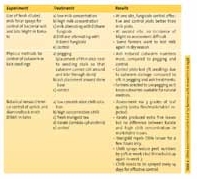Gabriele Stoll
Natural Crop Protection in the Tropics
Letting Information Come to Life
Letting information come to life
|
|
||
|
We Too are Proud to be
Researchers
|
|
|
|
|
 |
|
Letting information come to life
We Too are Proud to be Researchers
Farmer participatory training and research
in traditional pest and disease management
in Kenya
by Martin Kimani (CABI Kenya), Nehemiah
Mihindo (KIOF),
Stephanie Williamson (CABI UK )
Background
Smallholders in the central highlands of
East Africa grow cash crops such as coffee in mixed cropping
systems with vegetables and increasingly apply pesticides on a
calendar basis. The cost of agrochemicals absorbs a large
proportion of farmers' income and sometimes pesticides destined
for coffee are diverted onto vegetables and other food crops,
for which they are not recommended and may pose risks to human
health. Many small-scale farmers in these areas have virtually
abandoned their coffee bushes due to low coffee prices and the
rise in pesticide costs. Although alternative pest and disease
control options exist, there is very little readily available
information on
Integrated Pest Management (IPM) and
Integrated Crop Management (ICM)
which reaches this group of farmers, while
many of the NGOs promoting organic farming focus on kitchen
gardens and subsistence crops only.
Project history
Farmer Field School (FFS) projects had
been run successfully in vegetable crops in Asia and the issue
was whether this training approach could be useful for the crop
production problems experienced by Kenyan smallholders.
In 1995, a pilot Integrated Pest
Management (IPM) training project in coffee and vegetable
cropping systems was initiated in four districts in Kenya. Its
aim was to introduce sustainable pest management methods for
farmers to enable them to avoid the hazard posed by pesticides
to their own health and to consumers in produce residues and to
improve farmers’ income, mainly by reducing production
costs on agrochemical inputs.
The project started with a Participatory
Rural Appraisal (PRA) in four villages of the target districts
to identify important pest problems and opportunities for IPM
intervention. This was followed by a Training of Trainers (ToT)
course in 1996 involving 8 government extension service staff
and 3 trainers from an organic farming NGO.
The key objectives of the FFS pilot
training project were:
• Identify constraints of crop
production and develop appropriate training curriculum on IPM
for the target smallholder farming systems.
• Develop and implement a Training of
Trainers (ToT) course for government extension staff and NGO
field officers.
• Formulate appropriate IPM options
for Farmer Field Schools (FFS) suitable for local farming
systems.
• Extend the FFS approach to small
groups of farmers in the area targeted by the pilot project
and, in collaboration with the farmers, formulate suitable
participatory methods to address key production constraints.
After the success of the training work in
1996 further objectives were:
• Develop appropriate farmer
experiments to validate the efficacy of botanical extracts and
other physical/cultural methods of control suggested by
farmers.
• Refine ToT and FFS curricula with
the aim of building the trainers’ facilitation skills and
improving farmer experimentation and innovation.
• Enhance information sharing between
FFS groups through exchange visits.
• Collect colour pictures of natural
enemies, insect pests and diseases of vegetable/coffee for
publication as posters/booklets.
Ohter experiments carried out by farmers
with researchers in 1998
The printed version contains more
information about the following themes:
-Stakeholders
-Organizational structure
-Motivations and expectations of farmers
-Research approach, methodology,
management, outputs
-Tomato Nursery Experiment
-Economics
-Sustainability of approach
-Assessment and learning points
-Conclusions and recommendations
